Unit 5 First Aid Grammar 参考课件(共16张PPT)
文档属性
| 名称 | Unit 5 First Aid Grammar 参考课件(共16张PPT) | 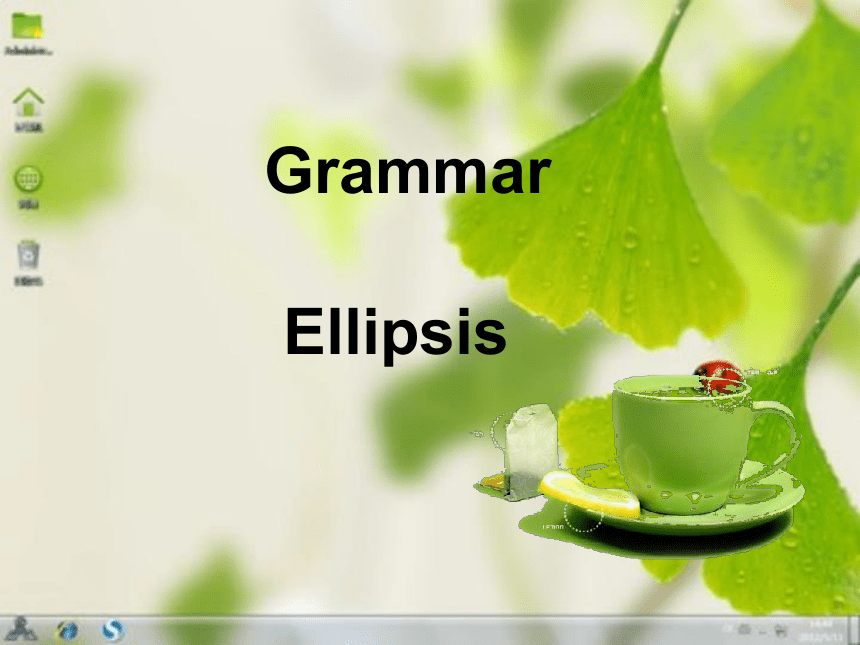 | |
| 格式 | zip | ||
| 文件大小 | 440.0KB | ||
| 资源类型 | 教案 | ||
| 版本资源 | 人教版(新课程标准) | ||
| 科目 | 英语 | ||
| 更新时间 | 2019-11-17 15:22:32 | ||
图片预览


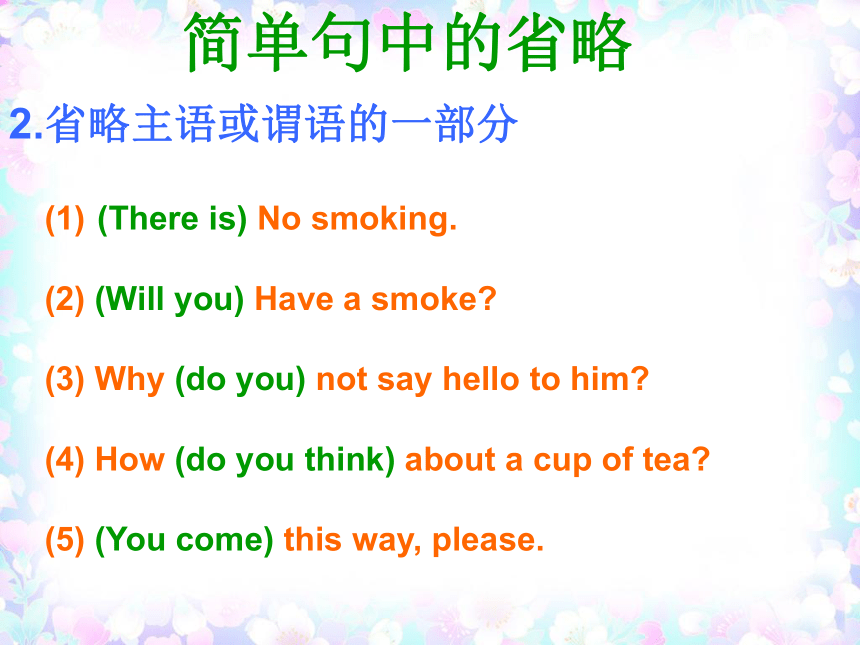
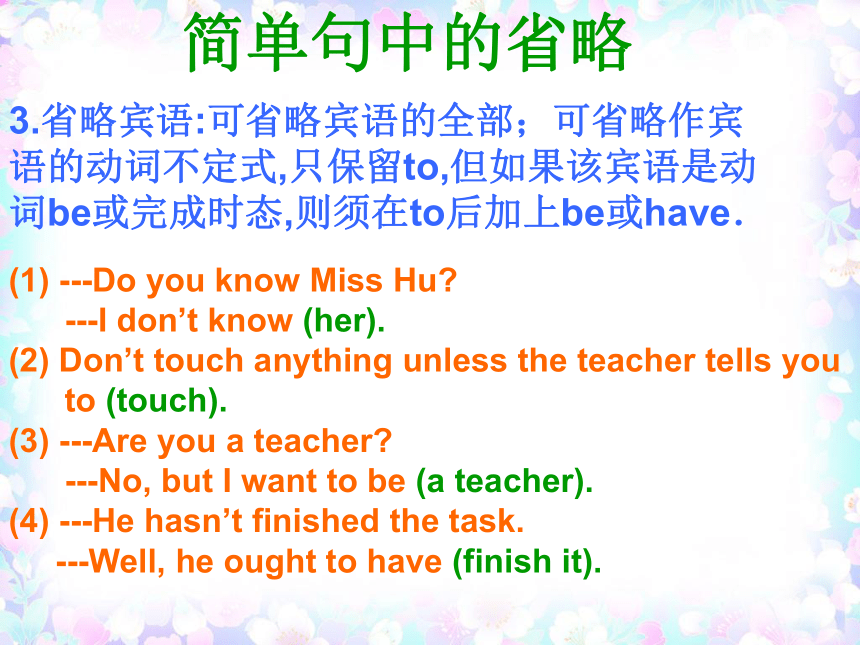
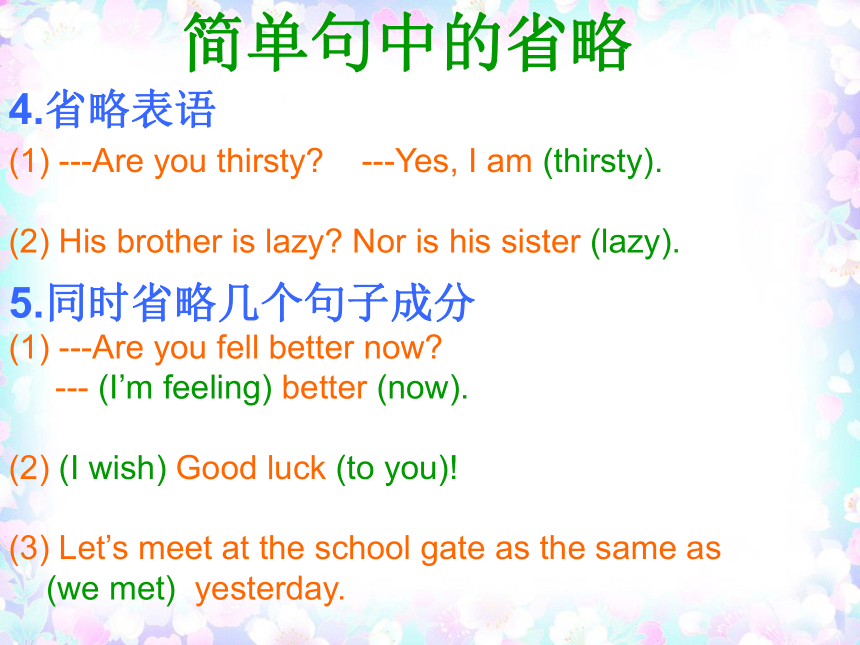
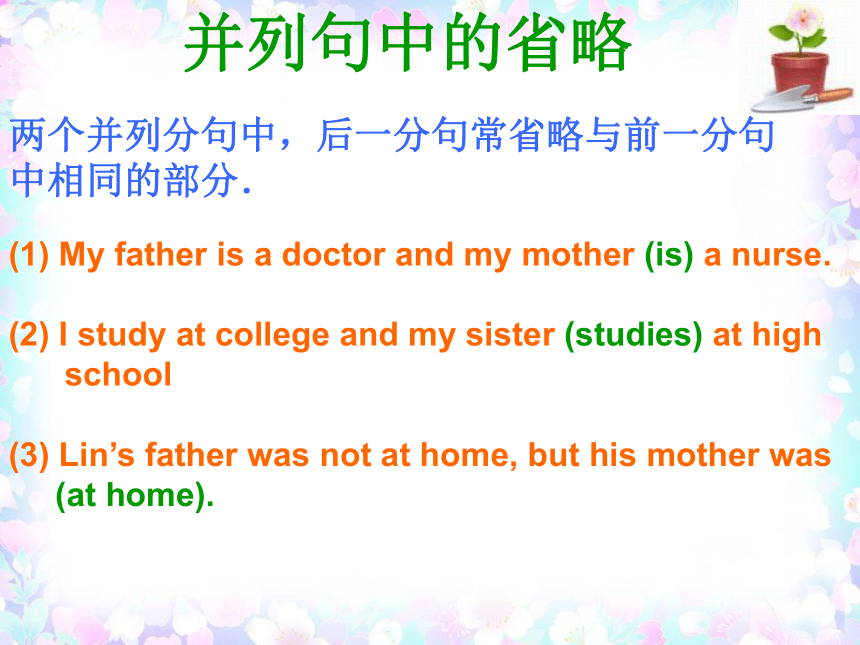

文档简介
(共16张PPT)
Grammar
Ellipsis
1.省略主语:祈使句中的主语通常被省略;其他
省略的主语的情况多限于少数现成的说法.
(1) (You) Come in, please.
(2) (I) See you tomorrow.
(3) (I) Thank you for your help.
(4) (I) Beg your pardon.
简单句中的省略
2.省略主语或谓语的一部分
简单句中的省略
(1) (There is) No smoking.
(2) (Will you) Have a smoke?
(3) Why (do you) not say hello to him?
(4) How (do you think) about a cup of tea?
(5) (You come) this way, please.
简单句中的省略
3.省略宾语:可省略宾语的全部;可省略作宾
语的动词不定式,只保留to,但如果该宾语是动
词be或完成时态,则须在to后加上be或have.
---Do you know Miss Hu?
---I don’t know (her).
(2) Don’t touch anything unless the teacher tells you
to (touch).
(3) ---Are you a teacher?
---No, but I want to be (a teacher).
(4) ---He hasn’t finished the task.
---Well, he ought to have (finish it).
简单句中的省略
4.省略表语
---Are you thirsty? ---Yes, I am (thirsty).
His brother is lazy? Nor is his sister (lazy).
5.同时省略几个句子成分
---Are you fell better now?
--- (I’m feeling) better (now).
(2) (I wish) Good luck (to you)!
(3) Let’s meet at the school gate as the same as
(we met) yesterday.
并列句中的省略
两个并列分句中,后一分句常省略与前一分句
中相同的部分.
(1) My father is a doctor and my mother (is) a nurse.
(2) I study at college and my sister (studies) at high
school
(3) Lin’s father was not at home, but his mother was
(at home).
主从复合句中的省略
1.主句中有一些主谓被省略
(I’m) Sorry to heat that you are ill.
(2) (It’s) a pity that you missed such a good chance.
2.省略从句中与主句相同的部分
They do not visit their parents as much as they ought to (visit their parents).
3.主句与从句各有一些成分被省略
The sooner (you do it) , the better (it will be ).
其他省略
1.连词的that省略
(1)宾语从句中常省略that,但多个宾语从句并列时,
通常只省略第一个that
He said (that) the text was very important and that we should learn it by heart.
(2)在定语从句中that在作宾语时才能省略
The book (that) I borrowed yesterday was hers.
2.在某些状语从句中,当从句的主语与主句的主语一致或者从句主语为it,且从句谓语部分有be动词时,可省去“主语+be”部分
其他省略
(1) When (he was) still a boy of 10, he had to work day and night.
(2) As (he was) a child, he lived in India.
(3) If (you are) asked you may come in.
(4) If (it is) necessary I’ll explain to you again.
(5) Though (he is) young, he knows a lot.
(6) He opened his lips as if (he were) to say something.
其他省略
3.不定式符号to的省略
并列的不定式可省去后面的 to.
I told him to sit down and wait for a moment.
(2) help 当“帮助”讲时,后面的宾语或宾补的不定式符号to可带可不带.
I will help (to) do it for you.
I will help you (to) do it.
(3)介词but前若有动词do,后面的不定式不带 to.
The boy did nothing but play.
其他省略
(4) 某些使役动词(let, make, have)及感官动词(see, watch, hear, notice, observe, feel, look at, listen to等)后面作宾语 补足语的不定式一定要省去 to, 但在被动语态中须将to 复原。
I saw the boy fall from the tree.
The boy was seen to fall from the tree.
The boss made us work 12 hours a day.
We were made to work 12 hours a day.
(5) 主语从句中有动词do,后面作表语的不定式的 to可带可不带。
What we can do now is (to) wait.
(6) find 当“发现”讲时,后面作宾语补足语的不定式符号to可带可不带。
We found him (to) work very hard at the experiment.
但如果是不定式 to be,则不能省略。
She found him to be dishonest.
其他省略
4.连词if在部分虚拟条件句中可省略,但要将后面的should,were,had提到主语的前面.
其他省略
Had they time, they would certainly come and help us.
(2) Were I you, I would do the work better.
(3)Should there be a flood, what should we do?
替代
(一)so和not作替代词,代替被省略的某个词(组)或句子,
一般同表示个人看法或想法的动词连用,作be afraid,
believe,become,all,do,expect,fear,hope,Imagine,
say, see, speak, suppose, think等的宾语。
Not代替否定的句子,还可放在perhaps,probably,
absolutely等副词后
E.g.: She was not angry at first, but became so
(=angry)after a while.
—Is he the best student in the class ?
—I think so(=He is best student in the class).
—I think not(=He is not the best student in the class).
替代
(二)替代的应用
1.So可以放在句首或句尾,但若谓语动词是see, notice,
hear等,则只能放在句首.如:
I believe (say, think…)so. =So I believe (say, think…).
—He is absent today.
—So I see (hear, notice).
2.在表示肯定或怀疑意义的句中不可用so。如:
误:I doubt so.
正:I doubt it.
3.在ask和know之后也不用so。如:
误:Why do you ask so ?
正:Why do you ask that ?
4.do so一般只用替代动态动词,不替代静态动词。如:
She said she would go with me, but she didn’t do so.
替代
---Alice feels better today.
---I think she does.
---So she does.
而不能说
I think she does so.
Grammar
Ellipsis
1.省略主语:祈使句中的主语通常被省略;其他
省略的主语的情况多限于少数现成的说法.
(1) (You) Come in, please.
(2) (I) See you tomorrow.
(3) (I) Thank you for your help.
(4) (I) Beg your pardon.
简单句中的省略
2.省略主语或谓语的一部分
简单句中的省略
(1) (There is) No smoking.
(2) (Will you) Have a smoke?
(3) Why (do you) not say hello to him?
(4) How (do you think) about a cup of tea?
(5) (You come) this way, please.
简单句中的省略
3.省略宾语:可省略宾语的全部;可省略作宾
语的动词不定式,只保留to,但如果该宾语是动
词be或完成时态,则须在to后加上be或have.
---Do you know Miss Hu?
---I don’t know (her).
(2) Don’t touch anything unless the teacher tells you
to (touch).
(3) ---Are you a teacher?
---No, but I want to be (a teacher).
(4) ---He hasn’t finished the task.
---Well, he ought to have (finish it).
简单句中的省略
4.省略表语
---Are you thirsty? ---Yes, I am (thirsty).
His brother is lazy? Nor is his sister (lazy).
5.同时省略几个句子成分
---Are you fell better now?
--- (I’m feeling) better (now).
(2) (I wish) Good luck (to you)!
(3) Let’s meet at the school gate as the same as
(we met) yesterday.
并列句中的省略
两个并列分句中,后一分句常省略与前一分句
中相同的部分.
(1) My father is a doctor and my mother (is) a nurse.
(2) I study at college and my sister (studies) at high
school
(3) Lin’s father was not at home, but his mother was
(at home).
主从复合句中的省略
1.主句中有一些主谓被省略
(I’m) Sorry to heat that you are ill.
(2) (It’s) a pity that you missed such a good chance.
2.省略从句中与主句相同的部分
They do not visit their parents as much as they ought to (visit their parents).
3.主句与从句各有一些成分被省略
The sooner (you do it) , the better (it will be ).
其他省略
1.连词的that省略
(1)宾语从句中常省略that,但多个宾语从句并列时,
通常只省略第一个that
He said (that) the text was very important and that we should learn it by heart.
(2)在定语从句中that在作宾语时才能省略
The book (that) I borrowed yesterday was hers.
2.在某些状语从句中,当从句的主语与主句的主语一致或者从句主语为it,且从句谓语部分有be动词时,可省去“主语+be”部分
其他省略
(1) When (he was) still a boy of 10, he had to work day and night.
(2) As (he was) a child, he lived in India.
(3) If (you are) asked you may come in.
(4) If (it is) necessary I’ll explain to you again.
(5) Though (he is) young, he knows a lot.
(6) He opened his lips as if (he were) to say something.
其他省略
3.不定式符号to的省略
并列的不定式可省去后面的 to.
I told him to sit down and wait for a moment.
(2) help 当“帮助”讲时,后面的宾语或宾补的不定式符号to可带可不带.
I will help (to) do it for you.
I will help you (to) do it.
(3)介词but前若有动词do,后面的不定式不带 to.
The boy did nothing but play.
其他省略
(4) 某些使役动词(let, make, have)及感官动词(see, watch, hear, notice, observe, feel, look at, listen to等)后面作宾语 补足语的不定式一定要省去 to, 但在被动语态中须将to 复原。
I saw the boy fall from the tree.
The boy was seen to fall from the tree.
The boss made us work 12 hours a day.
We were made to work 12 hours a day.
(5) 主语从句中有动词do,后面作表语的不定式的 to可带可不带。
What we can do now is (to) wait.
(6) find 当“发现”讲时,后面作宾语补足语的不定式符号to可带可不带。
We found him (to) work very hard at the experiment.
但如果是不定式 to be,则不能省略。
She found him to be dishonest.
其他省略
4.连词if在部分虚拟条件句中可省略,但要将后面的should,were,had提到主语的前面.
其他省略
Had they time, they would certainly come and help us.
(2) Were I you, I would do the work better.
(3)Should there be a flood, what should we do?
替代
(一)so和not作替代词,代替被省略的某个词(组)或句子,
一般同表示个人看法或想法的动词连用,作be afraid,
believe,become,all,do,expect,fear,hope,Imagine,
say, see, speak, suppose, think等的宾语。
Not代替否定的句子,还可放在perhaps,probably,
absolutely等副词后
E.g.: She was not angry at first, but became so
(=angry)after a while.
—Is he the best student in the class ?
—I think so(=He is best student in the class).
—I think not(=He is not the best student in the class).
替代
(二)替代的应用
1.So可以放在句首或句尾,但若谓语动词是see, notice,
hear等,则只能放在句首.如:
I believe (say, think…)so. =So I believe (say, think…).
—He is absent today.
—So I see (hear, notice).
2.在表示肯定或怀疑意义的句中不可用so。如:
误:I doubt so.
正:I doubt it.
3.在ask和know之后也不用so。如:
误:Why do you ask so ?
正:Why do you ask that ?
4.do so一般只用替代动态动词,不替代静态动词。如:
She said she would go with me, but she didn’t do so.
替代
---Alice feels better today.
---I think she does.
---So she does.
而不能说
I think she does so.
